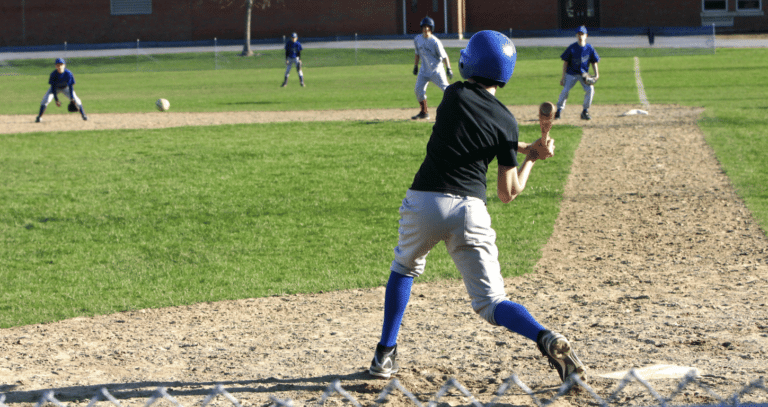How to Recognize Signs of Stress and Anxiety in Youth Baseball Players
- Erik
- October 24, 2024
- 10:13 am

Youth baseball brings joy, excitement, and valuable life lessons to young athletes. However, like any competitive activity, it can also be a source of stress and anxiety for players. Recognizing these signs early is crucial for parents and coaches to provide support and ensure the game remains fun and enriching. In this article, we’ll explore the physical, emotional, and behavioral signs of stress and anxiety in youth baseball players and offer tips on how to respond to these challenges.
Physical Signs of Stress and Anxiety
One of the first indicators that a youth baseball player might be experiencing stress or anxiety is through physical symptoms. While these signs can be subtle, they often manifest as unexplained discomfort or changes in the child’s physical well-being.
Some common physical signs to watch for include:
- Increased muscle tension or fatigue: If a player complains of muscle soreness or fatigue more frequently than usual, it may be a sign of stress. Anxiety often causes the body to stay in a heightened state of tension, leading to physical discomfort.
- Headaches or stomachaches: Stress and anxiety can result in headaches, stomachaches, or other aches that seem to appear without a clear cause.
- Changes in sleep patterns: Sleep is essential for youth athletes, but stress can disrupt normal sleep habits. Players who struggle to fall asleep, wake up frequently, or sleep excessively may be experiencing anxiety related to their performance or other pressures.
- Restlessness or difficulty focusing: If a player appears unusually restless or distracted on the field, stress may be affecting their ability to stay focused during games or practices.
Tip: Keep track of physical complaints that don’t seem tied to illness or injury. Stress can take a toll on a young athlete’s body, even if the signs are not immediately obvious.
Emotional and Behavioral Signs
Stress and anxiety can also impact a player’s emotional state and behavior. Emotional changes may be the most visible signs of an underlying issue, especially if the player is normally upbeat and enthusiastic.
Some common emotional and behavioral signs of stress include:
- Mood swings, irritability, or anger: If a player becomes more irritable or prone to mood swings—especially after games or practices—it may be a sign they are feeling overwhelmed by pressure.
- Crying or emotional outbursts: Emotional breakdowns after a poor performance, loss, or even minor mistakes can indicate that a player is placing too much pressure on themselves.
- Withdrawal from teammates or activities: A player who begins to isolate themselves from the team, avoids social interactions, or no longer enjoys activities they once loved could be struggling with stress.
- Fear of failure or excessive worry: If a young athlete frequently expresses fear about performing poorly or shows excessive concern over making mistakes, it’s a sign they may be experiencing anxiety. This fear can prevent them from enjoying the game and taking risks necessary for growth.
Tip: Encourage open conversations with players about how they’re feeling emotionally. Creating a supportive environment where they feel safe discussing their emotions can help alleviate some of the pressure.
Changes in Performance
Performance on the field can also signal stress or anxiety. If a player who normally performs well suddenly experiences a drop in their ability, it may not just be a slump—it could be stress affecting their performance.
Some signs of stress-related performance issues include:
- Inconsistent or declining performance: A player who typically plays well but begins making uncharacteristic mistakes or experiences a drop in skills may be dealing with performance anxiety.
- Overthinking during play: When a player hesitates or second-guesses themselves during a game, it may be a sign they are overthinking their actions due to fear of making mistakes.
- Avoiding key plays: Players experiencing anxiety might avoid critical game situations where the pressure is high, such as batting in key moments or pitching in close games. This avoidance behavior is often a way to protect themselves from the stress of failure.
Tip: Watch for changes in performance. If a player is struggling, offer support and remind them that mistakes are a natural part of learning and growth in sports.
Social Withdrawal or Isolation
Social changes can also be a red flag for stress or anxiety in youth baseball players. Team sports are generally very social, so if a player starts to withdraw, it could be a sign they are feeling overwhelmed.
Signs of social withdrawal include:
- Avoiding social interaction: If a player suddenly avoids hanging out with teammates or seems less engaged during practices and games, it could signal stress.
- Reduced enthusiasm for team events: A player who no longer looks forward to practices, games, or team gatherings may be experiencing anxiety, making it difficult for them to enjoy the social aspects of the sport.
- Lack of communication: If a player becomes quieter or less communicative about their baseball experiences, they may be bottling up their stress or anxiety.
Tip: If you notice a player withdrawing socially, check in with them and offer a safe space to talk about how they’re feeling.
Verbal Clues and Self-Expression
Sometimes, the signs of stress and anxiety are expressed directly through what the player says. Listening closely can help identify when a player is struggling emotionally.
Some verbal clues to look out for include:
- Statements of being overwhelmed: Phrases like “I’m just so tired” or “I can’t handle this” may indicate that a player feels burdened by the pressures of both school and sports.
- Negative self-talk: A player who says things like “I’m not good enough” or “I always mess up” may be struggling with self-doubt, a common symptom of anxiety.
- Expressing a desire to quit: If a young athlete talks about quitting or expresses feelings of hating baseball, it could signal they’re no longer enjoying the game due to stress.
Tip: If a player is expressing negative self-talk or showing signs of self-doubt, offer positive reinforcement and remind them of their strengths.
The Role of Parents and Coaches
Parents and coaches play a key role in helping young athletes manage stress and anxiety. Providing emotional support, reducing pressure, and focusing on the fun and developmental aspects of the game are essential. Encourage open communication, and remind players that it’s okay to feel stressed sometimes. The goal is to help them manage these emotions, not eliminate them entirely.
Strategies for supporting players include:
- Focusing on effort, not results: Praise effort rather than wins and losses to reduce performance pressure.
- Encouraging breaks: Sometimes, stepping away from the sport for a short time can help a player recharge and regain their love for the game.
- Building coping skills: Teach youth athletes techniques like deep breathing, positive self-talk, and visualization to help them manage stress during games.
How Guest Player Connect Supports Player Well-Being
At Guest Player Connect, we understand the pressure young athletes face, from worrying about winning to concerns over maintaining their spot in the lineup or starting position. Our flexible playing opportunities allow athletes to compete without these pressures. Players can focus on enjoying the game, building their skills, and gaining confidence in a relaxed atmosphere that emphasizes growth and development, not competition.
Conclusion
Recognizing the signs of stress and anxiety in youth baseball players is essential to ensuring they continue to enjoy the sport and develop in a healthy way. By staying attuned to physical, emotional, and behavioral signals, parents and coaches can provide the necessary support to help young athletes manage these feelings. Guest Player Connect offers a positive, low-pressure environment where players can thrive and focus on improving their skills while keeping the joy in the game.
Disclaimer: The information in this article is intended for educational purposes only. Guest Player Connect is not a licensed medical provider. If you or your child are experiencing stress, anxiety, or other concerns related to sports participation, we encourage you to seek advice from a qualified medical or mental health professional.
<div class="hs-cta-embed hs-cta-simple-placeholder hs-cta-embed-180940638302"
style="max-width:100%; max-height:100%; width:1270px;height:300px" data-hubspot-wrapper-cta-id="180940638302">
<a href="https://cta-service-cms2.hubspot.com/web-interactives/public/v1/track/redirect?encryptedPayload=AVxigLJ4FhWdtwEgCJVJyzFap3FB5uMyPeK1xiEY9qSkV62AfDx6gSVzkGeMAjtO2sSCOe6omihMD5l%2B%2FujBTVqATfErU6QukG9rBFhP%2B0w0Hu3EhhfcnsCrVKFYMsz4Uz5p80F75pp6sZf97co2%2FjabuiuM%2FsRcZydaD%2FePgAHdhi%2FXMty22ZcNKumZ9HqrKNl9Hzw%3D&webInteractiveContentId=180940638302&portalId=47324005" target="_blank" rel="noopener" crossorigin="anonymous">
<img alt="Baseball Tournament Email Header (1440 x 400 px) (1270 x 300 px) (2)" loading="lazy" src="https://no-cache.hubspot.com/cta/default/47324005/interactive-180940638302.png" style="height: 100%; width: 100%; object-fit: fill"
onerror="this.style.display='none'" />
</a>
</div>
Similar Blogs Posts



Copyright © 2024. All rights reserved.



